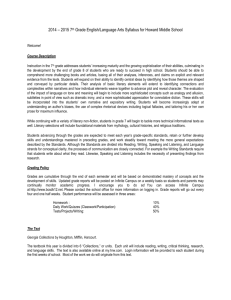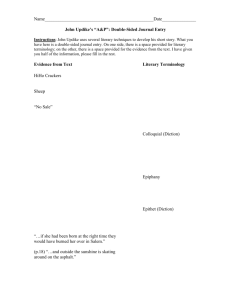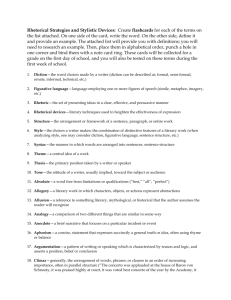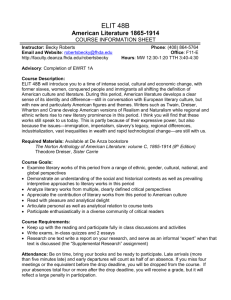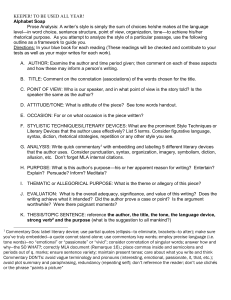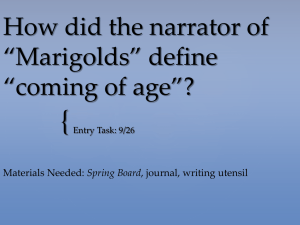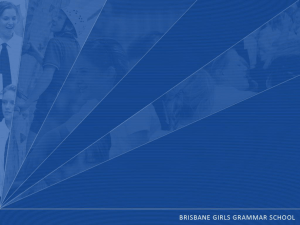2015-2016 Course Syllabus
advertisement
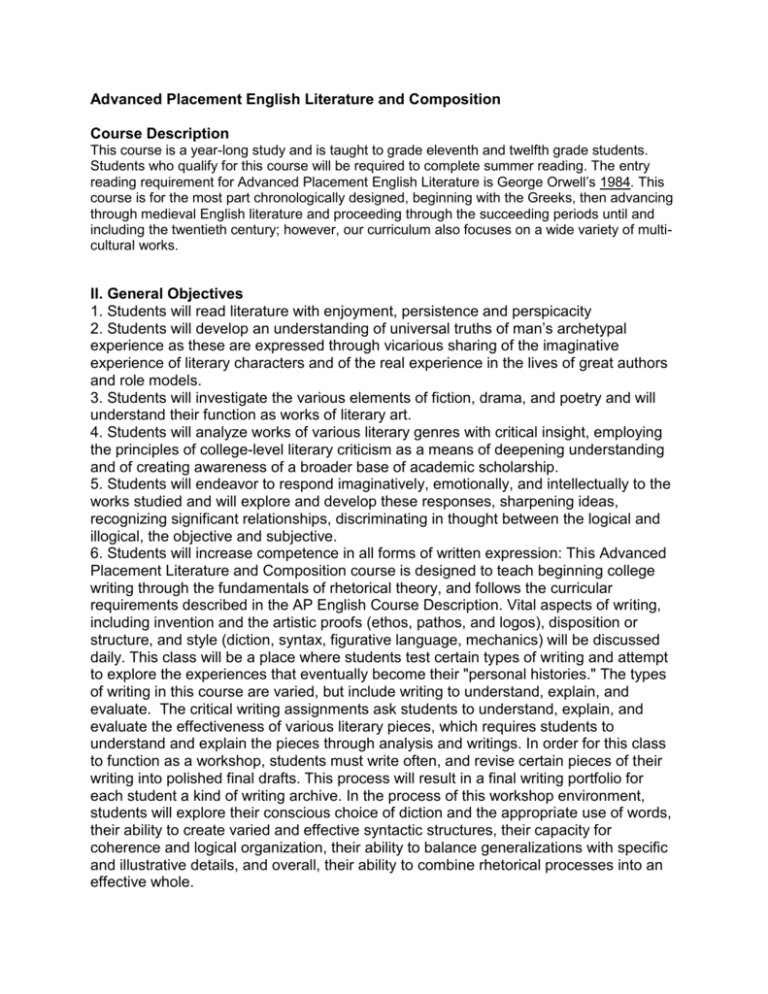
Advanced Placement English Literature and Composition Course Description This course is a year-long study and is taught to grade eleventh and twelfth grade students. Students who qualify for this course will be required to complete summer reading. The entry reading requirement for Advanced Placement English Literature is George Orwell’s 1984. This course is for the most part chronologically designed, beginning with the Greeks, then advancing through medieval English literature and proceeding through the succeeding periods until and including the twentieth century; however, our curriculum also focuses on a wide variety of multicultural works. II. General Objectives 1. Students will read literature with enjoyment, persistence and perspicacity 2. Students will develop an understanding of universal truths of man’s archetypal experience as these are expressed through vicarious sharing of the imaginative experience of literary characters and of the real experience in the lives of great authors and role models. 3. Students will investigate the various elements of fiction, drama, and poetry and will understand their function as works of literary art. 4. Students will analyze works of various literary genres with critical insight, employing the principles of college-level literary criticism as a means of deepening understanding and of creating awareness of a broader base of academic scholarship. 5. Students will endeavor to respond imaginatively, emotionally, and intellectually to the works studied and will explore and develop these responses, sharpening ideas, recognizing significant relationships, discriminating in thought between the logical and illogical, the objective and subjective. 6. Students will increase competence in all forms of written expression: This Advanced Placement Literature and Composition course is designed to teach beginning college writing through the fundamentals of rhetorical theory, and follows the curricular requirements described in the AP English Course Description. Vital aspects of writing, including invention and the artistic proofs (ethos, pathos, and logos), disposition or structure, and style (diction, syntax, figurative language, mechanics) will be discussed daily. This class will be a place where students test certain types of writing and attempt to explore the experiences that eventually become their "personal histories." The types of writing in this course are varied, but include writing to understand, explain, and evaluate. The critical writing assignments ask students to understand, explain, and evaluate the effectiveness of various literary pieces, which requires students to understand and explain the pieces through analysis and writings. In order for this class to function as a workshop, students must write often, and revise certain pieces of their writing into polished final drafts. This process will result in a final writing portfolio for each student a kind of writing archive. In the process of this workshop environment, students will explore their conscious choice of diction and the appropriate use of words, their ability to create varied and effective syntactic structures, their capacity for coherence and logical organization, their ability to balance generalizations with specific and illustrative details, and overall, their ability to combine rhetorical processes into an effective whole. 7. Students will become efficient in applying technological expertise and MLA form in researched presentations, both in writing and in speech. 8. Students will emerge from this year of Advanced Placement study as stronger thinkers, writers, and citizens, having experienced the bond of academic scholarship and rigorous commitment to personal and class goals. Unit Information Understanding Voice Introduction to Literary Styles 3 Weeks Content and/or Skills Taught: various short stories and poems Orwell’s 1984 close reading Unit Name: Ancient Through Medieval Notes on the Greek tragedy Reading and dramatization of Oedipus Rex Application of characteristics of the epic Unit Name: Italian Literatura: The Journey Begins Reading of Dante’s Inferno Unit Name: Renaissance Literature Background for Renaissance period in England Sonnets Elizabethan theater Study of Shakespeare's language and idioms Hamlet and The Taming of the Shrew: Unit Name: Existentialism Kafka's Metamorphosis Unit Name: Modern Literature Death of a Salesman Native Son Heart of Darkness Unit Name or Timeframe: Contemporary Novel The Kite Runner Expectations: • • • • • ALL STUDENTS to give 100 % effort. Be in your seat and ready to work before the tardy bell stops ringing Bring all necessary materials to class each day. You will not be allowed to leave class to retrieve the materials you have left behind. Raise your hand when you have something to ask or say. Show respect for classmates, teacher, school property, and yourself. 40% test grades - unit tests, final drafts, major projects, research papers, etc. 30% quiz grades - vocabulary quizzes, reading content quizzes, rough drafts, etc. 20% daily grades - class work, homework, reading checks, summaries, etc. 10% Benchmark test .
